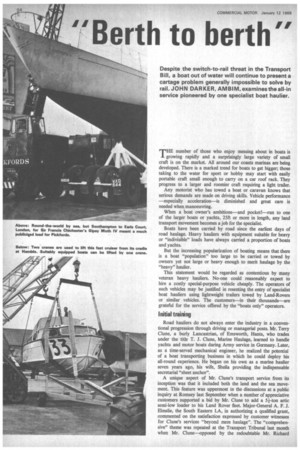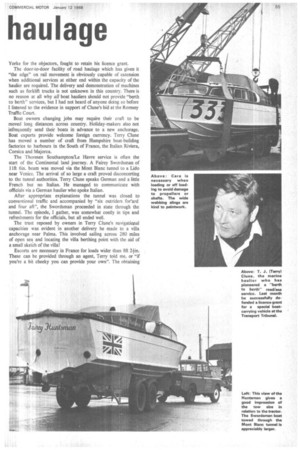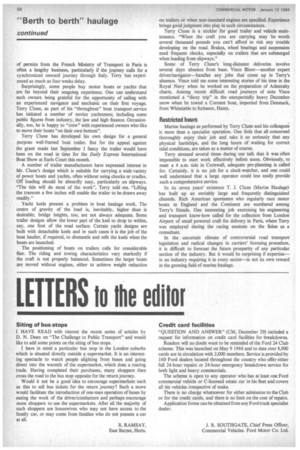"Berth to berth" haulage
Page 56

Page 57

Page 58

If you've noticed an error in this article please click here to report it so we can fix it.
Despite the switch-to-rail threat in the Transport Bill, a boat out of water will continue to present a cartage problem generally impossible to solve by rail. JOHN DARKER, AMBIM, examinesthe all-in service pioneered by one specialist boat haulier.
THE number of those who enjoy messing about in boats is growing rapidly and a surprisingly large variety of small craft is on the market. All around our coasts marinas are being developed. There is a marked trend for boats to get bigger; those taking to the water for sport or hobby may start with easily portable craft small enough to carry on a car roof rack. They progress to a larger and roomier craft requiring a light trailer.
Any motorist who has towed a boat or caravan knows that serious demands are made on driving skills. Vehicle performance —especially acceleration—is diminished and great care is needed when manoeuvring.
When a boat owner's ambitions—and pocket!—run to one of the larger boats or yachts, 25ft or more in length, any land transport movement becomes a job for the specialist.
Boats have been carried by road since the earliest days of road haulage. Heavy hauliers with equipment suitable for heavy or "indivisible" loads have always carried a proportion of boats and yachts.
But the increasing popularization of boating means that there is a boat "population" too large to be carried or towed by owners yet not large or heavy enough to merit haulage by the "heavy" haulier.
This statement would be regarded as contentious by many veteran heavy hauliers. No-one could reasonably expect to hire a costly special-purpose vehicle cheaply. The operators of such vehicles may be justified in resenting the entry of specialist boat hauliers using lightweight trailers towed by Land-Rovers or similar vehicles. The customers—in their thousands—are grateful for the service offered by the "boats only" operators.
Initial training Road hauliers do not always enter the industry in a conventional progression through driving or managerial posts. Mr. Terry Clune, a burly Lancastrian, of Emsworth, Hants, who trades under the title T. J. Clune, Marine Haulage, learned to handle yachts and motor boats during Army service in Germany. Later, as a time-served mechanical engineer, he realized the potential of a boat transporting business in which he could deploy his all-round experience. He began on his own as a marine haulier seven years ago, his wife, Sheila providing the indispensable secretarial "sheet anchor".
A unique aspect of Mr. Clune's transport service from its inception was that it included both the land and the sea movement. This feature was uppermost in the discussions at a public inquiry at Romsey last September when a number of appreciative customers supported a bid by Mr. Clune to add a 5,4-ton artic semi-low loader to his Land Rover fleet. Major-General A. F. J. Elmslie, the South Eastern LA, in authorizing a qualified grant, commented on the satisfaction expressed by customer witnesses for Clune's services "beyond mere haulage". The "comprehensive" theme was repeated at the Transport Tribunal last month when Mr. Clune—opposed by the redoubtable Mr. Richard
Yorke for the objectors, fought to retain his licence grant.
The door-to-door facility of road haulage which has given it "the edge" on rail movement is obviously capable of extension when additional services at either end within the capacity of the haulier are required. The delivery and demonstration of machines such as forklift trucks is not unknown in this country. There is no reason at all why all boat hauliers should not provide "berth to berth" services, but I had not heard of anyone doing so before I listened to the evidence in support of Clune's bid at the Ramsey Traffic Court
Boat owners changing jobs may require their craft to be moved long distances across country. Holiday-makers also not infrequently send their boats in advance to a new anchorage. Boat exports provide welcome foreign currency. Terry Clune has moved a number of craft from Hampshire boat-building factories to harbours in the South of France, the Italian Riviera, Corsica and Majorca.
The Thoresen Southampton/Le Havre service is often the start of the Continental land journey. A Fairey Swordsman of llft 6in. beam was moved via the Mont Blanc tunnel to a Lido near Venice. The arrival of so large a craft proved disconcerting to the tunnel authorities. Terry Chute speaks German and a little French but no Italian. He managed to communicate with officials via a German haulier who spoke Italian.
After appropriate explanations the tunnel was closed to conventional traffic and accompanied by "six outriders for'ard and four aft", the Swordsman proceeded in state through the tunnel. The episode, I gather, was somewhat costly in tips and refreshments for the officials, but all ended well.
The trust reposed by owners in Terry Chme's navigational capacities was evident in another delivery he made to a villa anchorage near Palma. This involved sailing across 280 miles of open sea and locating the villa berthing point with the aid of a small sketch of the villa!
Escorts are necessary in France for loads wider than 8ft 2+in. These can be provided through an agent, Terry told me, or "if you're a bit cheeky you can provide your own". The obtaining of permits from the French Ministry of Transport in Paris is often a lengthy business, particularly if the journey calls for a synchronized onward journey through Italy. Terry has experienced as much as four weeks delay.
Surprisingly, some people buy motor boats or yachts that are far beyond their seagoing experience. One can understand such owners being grateful for the opportunity of sailing with an experienced navigator and mechanic on their first voyage. Terry Clune, as part of his "throughout" boat transport service has initiated a number of novice yachtsmen; including some public figures from industry, the law and high finance. Occasionally, too, he is happy to "crew" with experienced owners who like to move their boats "on their own bottom".
Terry Clune has developed his own design for a general purpose well-framed boat trailer. But for the appeal against the grant made last September I fancy the trailer would have been on the road in time for the Daily Express International Boat Show at Earls Court this month.
A number of trailer manufacturers have expressed interest in Mr. Chine's design which is suitable for carrying a wide variety of power boats and yachts, often without using chocks or cradles. Off loading should be absurdly easy, particularly on slipways. "The tide will do most of the work", Terry told me. "Lifting the transom a few inches will enable the trailer to be drawn away readily."
Yacht keels present a problem in boat haulage work. The centre of gravity of the load is, inevitably, higher than is desirable; bridge heights, too, are not always adequate. Some trailer designs allow the lower part of the keel to drop to within, say, one foot of the road surface. Certain yacht designs are built with detachable keels and in such cases it is the job of the boat haulier, if required., to dismantle and refit the keels when the boats are launched.
The positioning of boats on trailers calls for considerable flair. The riding and towing characteristics vary markedly if the craft is not properly balanced. Sometimes the larger boats are moved without engines, either to achieve weight reduction on trailers or when non-standard engines are specified. Experience brings good judgment into play in such circumstances.
Terry Clune is a stickler for good trailer and vehicle maintenance. "When the craft you are carrying may be worth several thousand pounds you can't afford to risk any trouble developing on the road. Brakes, wheel bearings and suspension need frequent checks, especially on trailers that are submerged when loading from slipways."
Some of Terry Clune's long-distance deliveries involve several clays absence from base. Vince Bloor—another expert driver/navigator—handles any jobs that come up in Terry's absence. Vince told me some interesting stories of his time in the Royal Navy when he worked on the preparation of Admiralty charts. Among recent difficult road journeys of note Vince mentioned a "dicey trip" in the unexpectedly heavy December snow when he towed a Coronet boat, imported from Denmark, from Whitstable to Itchenor, Hants.
Restricted hours Marine haulage as performed by Terry Clune and his colleagues is more than a specialist operation. One feels that all concerned thoroughly enjoy their job and take it so seriously that any physical hardships, and the long hours of waiting for correct tidal conditions, are taken as a matter of course.
Terry stressed several times during our talk that it was often impossible to start work effectively before noon. Obviously, to meet a 4 a.m. tide in Cornwall, adequate pre-planning is called for. Certainty, it is no job for a clock-watcher, and one could well understand that a large operator could less easily provide such a comprehensive service.
In its seven years' existence T. J. Clune (Marine Haulage) has built up an enviably large and frequently distinguished clientele. Rich American sportsmen who regularly race motor boats in England and the Continent are numbered among Terry's friends. One interesting job exercising his engineering and transport know-how called for the collection from London Airport of small powered craft for delivery in Paris, where Terry was employed during the racing sessions on the Seine as a consultant.
In the uncertain climate of controversial road transport legislation and radical changes in carriers' licensing procedure, it is difficult to forecast the future prosperity of any particular section of the industry. But it would be surprising if expertise— in an industry requiring it in every sector—is not its own reward in the growing field of marine haulage.
















































































































